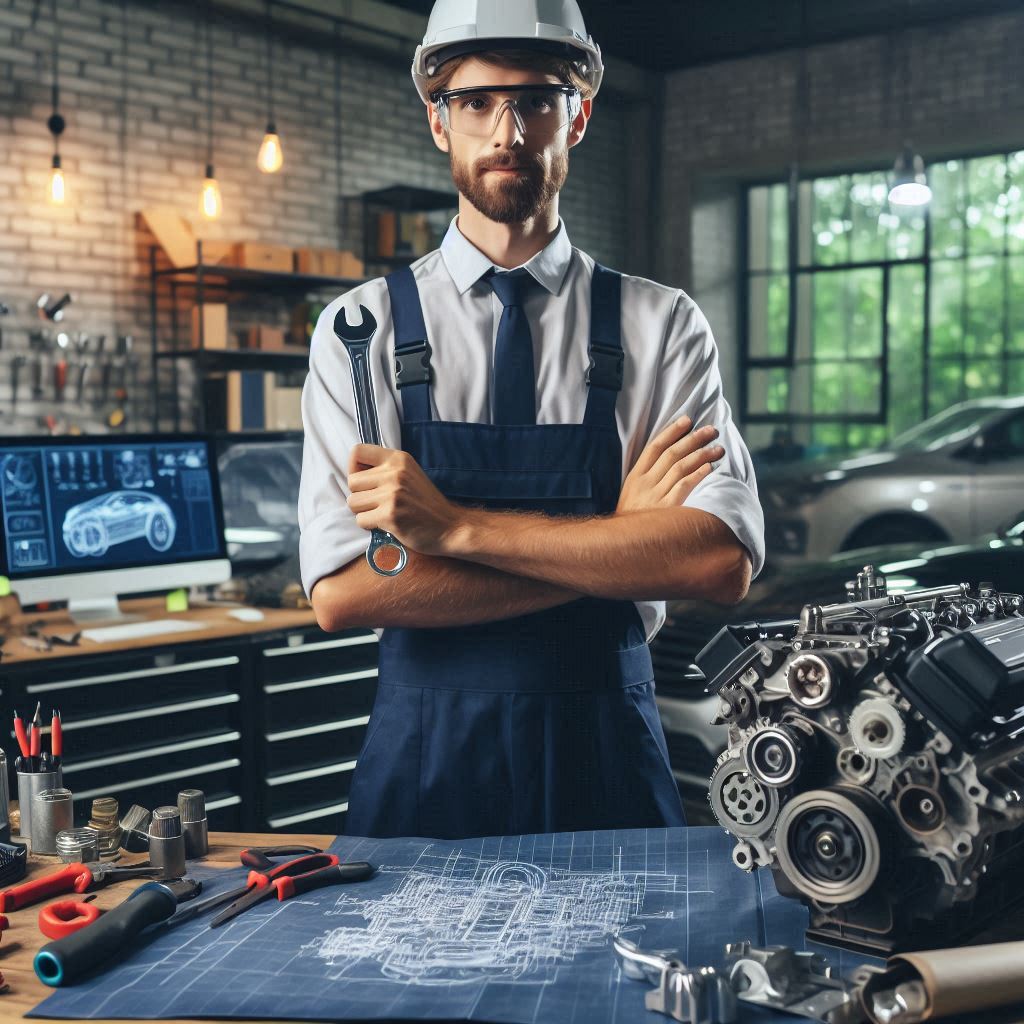Introduction
Overview of the Importance of Automotive Engineers in the Automotive Industry
Automotive engineers play a critical role in the automotive industry.
They design, develop, and test vehicles to ensure safety, efficiency, and performance.
Their expertise drives innovation, making cars safer, more reliable, and more enjoyable to drive.
Without skilled automotive engineers, the industry would struggle to meet the increasing demands for advanced and sustainable transportation solutions.
The Rapid Technological Advancements in the Industry
The automotive industry is experiencing rapid technological advancements.
Electric vehicles, autonomous driving, and connected car technologies are revolutionizing transportation.
These innovations demand highly skilled engineers who can adapt to new challenges and lead the industry forward.
Advanced materials and manufacturing techniques, like 3D printing and automation, are changing how vehicles are built.
Engineers must stay updated with these advancements to design and produce cutting-edge vehicles.
The push towards greener and more efficient vehicles also highlights the need for expertise in alternative fuels and energy systems.
As the industry evolves, the role of automotive engineers becomes increasingly crucial in shaping the future of transportation.
Strong Foundation in Mechanical Engineering
Automotive engineers must have a solid foundation in mechanical engineering.
This knowledge forms the backbone of their expertise.
Understanding core principles like thermodynamics, fluid mechanics, and materials science is essential.
These principles guide the design, testing, and manufacturing of automotive systems.
Understanding of Principles Such as Thermodynamics, Fluid Mechanics, and Materials Science
- Thermodynamics: plays a crucial role in automotive engineering. Engineers need to understand energy transfer and conversion. This knowledge helps in designing efficient engines and cooling systems. They can optimize fuel consumption and reduce emissions with this understanding.
- Fluid mechanics: is another vital area. Engineers must comprehend how fluids behave under various conditions. This knowledge is essential for designing effective braking systems, lubrication processes, and fuel injection systems. It also helps in aerodynamic designs, improving vehicle performance and stability.
- Materials science: is equally important. Automotive engineers must know how different materials behave. This includes understanding their strength, durability, and weight. They use this knowledge to select appropriate materials for various parts. This ensures the vehicle is safe, reliable, and cost-effective.
Ability to Apply These Principles to Design, Test, and Manufacture Automotive Systems
Applying these principles is a critical skill for automotive engineers.
They need to design automotive systems that meet specific requirements.
This involves creating detailed plans and specifications.
Engineers must consider factors like performance, safety, and cost during the design phase.
Testing is another crucial aspect.
Engineers must verify that their designs work as intended.
This involves conducting various tests and simulations.
They need to identify and fix any issues that arise.
This ensures the final product is reliable and meets all standards.
Manufacturing is the final step.
Engineers must oversee the production process.
This includes ensuring that parts are made to specifications.
They need to monitor quality control and address any production issues.
This guarantees that the final product is of high quality.
In summary, a strong foundation in mechanical engineering is vital for automotive engineers.
They must understand thermodynamics, fluid mechanics, and materials science.
Applying these principles to design, test, and manufacture automotive systems is essential.
This knowledge ensures that vehicles are efficient, safe, and reliable.
Read: The Role of Aerospace Engineers in Satellite Development
Proficiency in Computer-Aided Design (CAD) Software
Automotive engineers need proficiency in computer-aided design (CAD) software.
Mastery of these tools is crucial for modern engineering tasks.
Knowledge of specific software like CATIA, SolidWorks, and AutoCAD enhances an engineer’s ability to create precise and efficient designs.
Knowledge of Software Like CATIA, SolidWorks, and AutoCAD
- CATIA: is a comprehensive CAD software suite used in the automotive industry. It enables engineers to design complex components with high precision. This software supports 3D modeling, which is essential for visualizing and refining designs.
- SolidWorks: is another vital tool. It is known for its user-friendly interface and powerful features. Engineers use SolidWorks for creating detailed parts and assemblies. The software also offers robust simulation capabilities, allowing engineers to test their designs under various conditions.
- AutoCAD: remains a staple in the engineering world. It is widely used for drafting and designing 2D and 3D models. AutoCAD is particularly useful for creating detailed schematics and blueprints. Its versatility makes it a valuable tool for automotive engineers.
Ability to Create Detailed Designs and Simulations for Automotive Components
Creating detailed designs is a core responsibility of automotive engineers.
CAD software allows them to develop precise models of automotive components.
These detailed designs ensure that parts fit together correctly and function as intended.
Engineers must also create simulations to test their designs.
CAD software provides powerful simulation tools.
These tools help engineers evaluate how components will perform in real-world conditions.
Simulations can predict issues such as stress, heat, and fluid flow.
Identifying these issues early in the design process saves time and resources.
The ability to create accurate simulations is crucial for ensuring safety and reliability.
Engineers can test how components respond to various forces and conditions.
This helps in optimizing designs for performance and durability.
Simulations also allow for virtual testing, reducing the need for physical prototypes.
In the manufacturing phase, CAD software ensures precision.
Engineers use these tools to create detailed specifications for production.
This includes dimensions, materials, and assembly instructions.
Accurate CAD models help in streamlining the manufacturing process and maintaining quality control.
In summary, proficiency in CAD software is essential for automotive engineers.
Knowledge of tools like CATIA, SolidWorks, and AutoCAD enhances their design capabilities.
The ability to create detailed designs and simulations ensures that automotive components are precise, reliable, and efficient.
This skill set is crucial for meeting the demands of modern automotive engineering.
Read: Aerospace Engineering in Commercial Spaceflight
Experience with Automotive Systems and Technologies
Automotive engineers must have experience with various automotive systems and technologies.
This experience is crucial for adapting to evolving industry demands.
Familiarity with electric vehicles, hybrid systems, and autonomous driving technology is essential.
Understanding the latest trends and innovations ensures engineers stay ahead in the field.
Familiarity with Electric Vehicles, Hybrid Systems, and Autonomous Driving Technology
- Electric vehicles (EVs): represent a significant shift in automotive technology. Engineers must understand the components and systems unique to EVs. This includes battery technology, electric motors, and regenerative braking systems. Knowledge of these elements is vital for designing and optimizing electric vehicles.
- Hybrid systems: combine traditional internal combustion engines with electric propulsion. Engineers need expertise in integrating these two power sources. They must understand how to balance performance, fuel efficiency, and emissions. This knowledge is essential for developing advanced hybrid vehicles that meet environmental regulations.
- Autonomous driving technology: is at the forefront of automotive innovation. Engineers must be familiar with sensors, cameras, and control systems used in autonomous vehicles. Understanding the algorithms and software that enable self-driving capabilities is also crucial. This technology requires a deep knowledge of machine learning and real-time data processing.
Understanding of the Latest Trends and Innovations in the Automotive Industry
Keeping up with the latest trends is crucial for automotive engineers.
The industry is rapidly evolving with new technologies and innovations.
Engineers must stay informed about advancements in materials, design techniques, and manufacturing processes.
- Advanced driver-assistance systems (ADAS): are becoming increasingly common. Engineers need to understand how these systems enhance vehicle safety. This includes features like adaptive cruise control, lane-keeping assist, and automated parking.
- Connectivity: is another key trend. Engineers must be aware of how vehicles are integrating with digital ecosystems. This includes infotainment systems, vehicle-to-everything (V2X) communication, and over-the-air updates. These technologies improve the driving experience and vehicle performance.
- Sustainability: is a growing focus in the automotive industry. Engineers need to understand how to design vehicles that are more environmentally friendly. This includes using sustainable materials and improving fuel efficiency.
In summary, experience with automotive systems and technologies is essential for automotive engineers.
Familiarity with electric vehicles, hybrid systems, and autonomous driving technology is crucial.
Staying updated on the latest trends and innovations ensures engineers remain competitive and capable in a rapidly changing industry.
This expertise is key to developing advanced, efficient, and cutting-edge automotive solutions.
Read: The Impact of Aerospace Engineering on Modern Life

Skills in Data Analysis and Interpretation
Automotive engineers must possess strong skills in data analysis and interpretation.
This expertise is vital for making informed decisions and improving automotive designs.
The ability to collect and analyze data from tests and simulations is essential for optimizing vehicle performance.
Ability to Collect and Analyze Data from Tests and Simulations
- Data collection: is a fundamental skill for automotive engineers. Engineers gather data from various sources, including physical tests and computer simulations. This data includes performance metrics, stress responses, and efficiency measurements.
- Analyzing: this data requires a thorough understanding of statistical methods and analytical tools. Engineers use software to process and interpret complex datasets. They identify trends, patterns, and anomalies that provide insights into vehicle performance.
- Tests and simulations: provide critical information about how automotive systems function under different conditions. Engineers must be adept at using tools like sensors, data loggers, and simulation software. Accurate data collection and analysis help in assessing how components perform and interact.
Use of Data to Make Informed Decisions and Improvements to Automotive Designs
- Data-driven decision-making: is crucial in automotive engineering. Engineers use the insights gained from data analysis to guide their design choices. This involves evaluating the performance of different design options and selecting the most effective solutions.
- Improving automotive: designs relies on understanding data trends. Engineers identify areas where performance can be enhanced or issues can be resolved. For example, data might reveal inefficiencies in a powertrain, leading to design modifications that improve fuel efficiency.
- Predictive analysis: is another important application. Engineers use data to anticipate potential issues and design improvements. By analyzing past performance and test results, they can predict how future designs will behave under various conditions.
- Continuous improvement: is driven by data insights. Engineers use feedback from tests and simulations to refine and optimize their designs. This iterative process ensures that each design iteration performs better than the last.
In summary, skills in data analysis and interpretation are crucial for automotive engineers.
The ability to collect and analyze data from tests and simulations enables engineers to make informed decisions.
Using this data to improve automotive designs ensures that vehicles are optimized for performance, efficiency, and safety.
These skills are essential for driving innovation and achieving engineering excellence in the automotive industry.
Read: How Agricultural Engineers Improve Crop Yields
Effective Communication and Teamwork
Automotive engineers must excel in effective communication and teamwork.
These skills are vital for successful project completion.
Collaboration with other engineers, designers, and technicians ensures that all aspects of a project are well-coordinated and executed.
Collaboration with Other Engineers, Designers, and Technicians
- Collaboration: is essential in automotive engineering. Engineers work with a diverse team, including designers, technicians, and other engineers. Each team member brings unique expertise to the project. Effective teamwork ensures that all technical and aesthetic aspects are considered.
- Engineers collaborate: with designers to ensure that the vehicle’s form and function are harmoniously integrated. They work with technicians to ensure that components are manufactured and assembled correctly. This collaboration is crucial for developing innovative and reliable automotive solutions.
- Problem-solving: is a team effort. Engineers must work together to identify issues and develop effective solutions. This involves brainstorming, discussing various approaches, and testing different ideas. Collaboration fosters creativity and leads to more robust solutions.
Clear Communication of Ideas and Solutions to Team Members and Stakeholders
- Clear communication: is vital for the success of any engineering project. Engineers must convey complex ideas and technical details to team members and stakeholders. This ensures everyone understands the project requirements and objectives.
- Technical communication: involves creating detailed reports, specifications, and diagrams. Engineers must articulate their ideas clearly and concisely. This helps in avoiding misunderstandings and ensuring that everyone is on the same page.
- Presentations: are another important aspect. Engineers often present their ideas, findings, and solutions to stakeholders. This includes project managers, clients, and senior engineers. Effective presentations require clear articulation and visual aids to convey complex information effectively.
- Listening skills: are equally important. Engineers must listen to feedback and input from team members and stakeholders. This helps in understanding different perspectives and integrating valuable insights into the project.
- Conflict resolution: is a part of teamwork. Engineers must address disagreements and find common ground. Effective communication helps in resolving conflicts and maintaining a positive team environment.
In summary, effective communication and teamwork are crucial for automotive engineers.
Collaboration with other engineers, designers, and technicians ensures that projects are well-coordinated.
Clear communication of ideas and solutions to team members and stakeholders is essential.
These skills foster a collaborative environment and drive successful project outcomes.
Problem-Solving and Critical Thinking Abilities
Automotive engineers must possess strong problem-solving and critical thinking abilities.
These skills are essential for identifying and addressing issues in automotive systems.
Thinking creatively to overcome challenges and optimize designs ensures that vehicles meet performance, safety, and efficiency standards.
Identifying Issues in Automotive Systems and Proposing Solutions
- Problem identification: is the first step in the engineering process. Engineers must be adept at detecting issues in automotive systems. This involves analyzing data from tests and simulations, monitoring performance, and identifying areas of concern.
- Root cause analysis: helps engineers understand the underlying problems. By dissecting an issue, they can determine its origin and impact. This process involves examining various components, interactions, and conditions to pinpoint the exact cause of a problem.
- Proposing solutions: requires a systematic approach. Engineers must evaluate different methods to address the identified issues. This includes brainstorming potential solutions, considering their feasibility, and assessing their impact on the overall system.
- Testing and validation: are crucial. Once a solution is proposed, engineers must test it to ensure it resolves the issue without creating new problems. This involves simulations, prototypes, and real-world testing to validate the effectiveness of the solution.
Thinking Creatively to Overcome Challenges and Optimize Designs
- Creative thinking: is vital for overcoming engineering challenges. Engineers must think outside the box to find innovative solutions. This involves exploring unconventional ideas and approaches that can lead to breakthroughs in design and performance.
- Optimization: is a continuous process. Engineers must constantly seek ways to improve designs. This involves analyzing performance data, identifying inefficiencies, and making adjustments. Optimization ensures that vehicles are as efficient, safe, and reliable as possible.
- Scenario analysis: helps engineers anticipate potential challenges. By considering different scenarios and their outcomes, engineers can prepare for various possibilities. This proactive approach helps in developing robust designs that can withstand different conditions.
- Interdisciplinary knowledge: enhances problem-solving. Engineers must draw on knowledge from various fields, such as materials science, electronics, and software engineering. This interdisciplinary approach helps in developing comprehensive solutions to complex problems.
- Iterative design: is essential for optimization. Engineers must be willing to revisit and refine their designs. This involves incorporating feedback, testing new ideas, and making continuous improvements. Iterative design ensures that the final product is the best it can be.
In summary, problem-solving and critical thinking abilities are crucial for automotive engineers.
Identifying issues in automotive systems and proposing effective solutions is essential.
Thinking creatively to overcome challenges and optimize designs ensures that vehicles meet high standards of performance, safety, and efficiency.
These skills drive innovation and excellence in automotive engineering.
Discover More: Networking Tips for Aspiring IT Support Specialists
Transform Your Career Today
Unlock a personalized career strategy that drives real results. Get tailored advice and a roadmap designed just for you.
Start NowFind Out More: Field Service Technician Job Growth Projections
Delve into the Subject: Geotechnical Engineering: Field Safety Tips
Project Management Skills
Automotive engineers need strong project management skills.
These skills are vital for organizing and prioritizing tasks within project timelines.
Coordination with team members is crucial to ensure successful project completion.
Ability to Organize and Prioritize Tasks Within Project Timelines
- Task organization: is fundamental in project management. Engineers must break down projects into manageable tasks. This involves identifying all necessary steps, from initial design to final production. A detailed project plan helps in tracking progress and managing resources efficiently.
- Prioritizing tasks: is equally important. Engineers must determine which tasks are critical and which can be scheduled later. This prioritization ensures that essential tasks are completed on time, preventing delays in the project timeline. Engineers use tools like Gantt charts and project management software to schedule and monitor tasks effectively.
- Time management: is crucial for meeting deadlines. Engineers must allocate appropriate time to each task, considering potential challenges and uncertainties. This involves setting realistic deadlines and buffer times to accommodate any unexpected delays. Effective time management ensures the project stays on track and within budget.
Coordination with Team Members to Ensure Successful Project Completion
- Team coordination: is essential for project success. Engineers must work closely with team members, including other engineers, designers, and technicians. Clear communication ensures everyone understands their roles and responsibilities. Regular meetings and updates help in tracking progress and addressing any issues promptly.
- Delegation: is a key aspect of coordination. Engineers must delegate tasks based on team members’ expertise and workload. Effective delegation ensures that tasks are completed efficiently and team members are not overwhelmed.
- Collaboration tools: facilitate coordination. Engineers use project management software, shared documents, and communication platforms to collaborate effectively. These tools help in sharing information, tracking progress, and maintaining transparency within the team.
- Problem-solving: in a team context is crucial. Engineers must work together to identify and resolve issues. This involves brainstorming solutions, discussing alternatives, and reaching a consensus. Collaborative problem-solving ensures that solutions are well-rounded and effective.
- Stakeholder communication: is part of project management. Engineers must keep stakeholders informed about project progress, challenges, and milestones. Regular updates and reports ensure that stakeholders are aware of the project’s status and can provide necessary support or feedback.
In summary, project management skills are crucial for automotive engineers.
The ability to organize and prioritize tasks within project timelines ensures that projects are completed efficiently.
Coordination with team members is essential for successful project completion.
These skills enable engineers to manage complex projects, meet deadlines, and deliver high-quality results.
Explore Further: Common Challenges in Biomedical Technician Jobs
Find Out More: Telecommunications Technician: Project Management Skills
Conclusion
The Top Skills Needed for Automotive Engineers Today
To excel, automotive engineers need strong analytical skills, proficiency in CAD software, and solid knowledge of materials science.
Mastery in mechanical and electrical systems, coupled with project management abilities, is crucial.
Familiarity with vehicle safety standards and regulations is also essential.
These skills ensure engineers can design, test, and improve vehicles effectively.
The Importance of Continuous Learning and Adaptation to Stay Competitive in the Industry
Continuous learning and adaptation are vital in this fast-evolving industry.
New technologies and methodologies emerge rapidly, demanding engineers stay updated.
Engaging in professional development and seeking new certifications can help.
By embracing lifelong learning, engineers remain competitive and innovative.
The industry thrives on fresh ideas and advanced skills.
Staying current with industry trends and advancements is crucial for career growth.
Automotive engineers who prioritize continuous improvement drive the future of automotive innovation.
Adaptability and a commitment to learning will ensure they lead in this dynamic field.
[E-Books for Sale]
The Big Book of 500 High-Paying Jobs in America: Unlock Your Earning Potential
$19.99 • 500 High-Paying Jobs • 330 pages
Explore 500 high-paying jobs in America and learn how to boost your career, earn more, and achieve success!
See All 500 High-Paying Jobs of this E-Book
1001 Professions Without a Degree: High-Paying American Jobs You Can Start Now
$19.99 • 1001 Professions Without a Degree • 174 pages
Discover 1001 high-paying jobs without a degree! Unlock career tips, skills, and success strategies for just $19.99!




